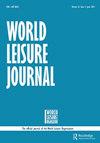2019冠状病毒病证书:包容性休闲背景下对可及性的影响
IF 2
Q3 HOSPITALITY, LEISURE, SPORT & TOURISM
引用次数: 2
摘要
与其他国家一样,法国休闲和旅游业复苏的先决条件之一是采用被称为“Covid-19证书”的验证文件,然而,这一引入存在广泛争议。考虑到某些人拒绝使用该证书,为了实现包容性,本探索性研究考察了Covid-19证书要求对休闲的影响。采用顺序混合方法探索性设计进行两项相关研究,使用来自网络图谱(n = 250在线评论)和相关受试者(n = 245参与者)的调查数据。首先,提出了六个假设来解释拒绝的原因。使用扫描电镜对这些假设进行了测试和验证,结果表明,要求获得Covid-19证书才能获得休闲服务使一部分人口处于不利地位,导致被排斥。Covid-19证书的引入,对包容性社会提出了新的挑战。在休闲的背景下,获得的结果可以指出与使用Covid-19证书相关的参与限制,因此可以用于指导特殊情况下的管理策略。本文章由计算机程序翻译,如有差异,请以英文原文为准。
The Covid-19 certificate: consequences on accessibility in the context of inclusive leisure
ABSTRACT One of the prerequisites for the resurgence of the leisure and tourism sector in France, as in other countries, is the adoption of verification documents known as “Covid-19 Certificate” However, this introduction is widely debated. In an endeavor to inclusiveness, given the rejection of the use of this certificate among certain individuals, this exploratory study examines the impact of the Covid-19 certificate requirement on access to leisure. A sequential mixed-methods exploratory design was used to conduct two interrelated studies using data from a netnography (n = 250 online comments), and surveys among concerned subjects (n = 245 participants). First, six hypotheses are proposed to explain the causes of refusal. These hypotheses are tested and validated using SEM, and the results show that the requirement of the Covid-19 certificate to access leisure services places a part of the population at a disadvantage, leading to exclusion. The introduction of the Covid-19 certificate, poses a new challenge for the inclusive society. In the context of leisure, the results obtained allow to point out the constraints of participation related to the use of the Covid-19 certificate and can thus be useful to guide management strategies in an exceptional situation.
求助全文
通过发布文献求助,成功后即可免费获取论文全文。
去求助
来源期刊

World Leisure Journal
HOSPITALITY, LEISURE, SPORT & TOURISM-
CiteScore
3.10
自引率
6.20%
发文量
34
期刊介绍:
As the official journal of the World Leisure Organisation, the purpose of the World Leisure Journal is to stimulate and communicate research, theory, and critical thought in all areas that address leisure, including play, recreation, the arts and culture, sport, festivals, events and celebrations, health and fitness, and travel and tourism. Empirical and theoretical manuscripts, as well as position papers, review articles, and critical essays are published in the World Leisure Journal . The World Leisure Journal is international in scope, and encourages submissions from authors from all areas of the world. Comparative cross-national and cross-cultural research reports are especially welcome. For empirical papers, all types of research methods are appropriate and the subject matter in papers may be addressed from perspectives derived from the social, behavioural, and biological sciences, education, and the humanities. Both pure and applied research reports are appropriate for publication in the World Leisure Journal . In addition to original research reports and review essays, book reviews, research notes, comments, and methodological contributions are appropriate for publication in the World Leisure Journal .
 求助内容:
求助内容: 应助结果提醒方式:
应助结果提醒方式:


